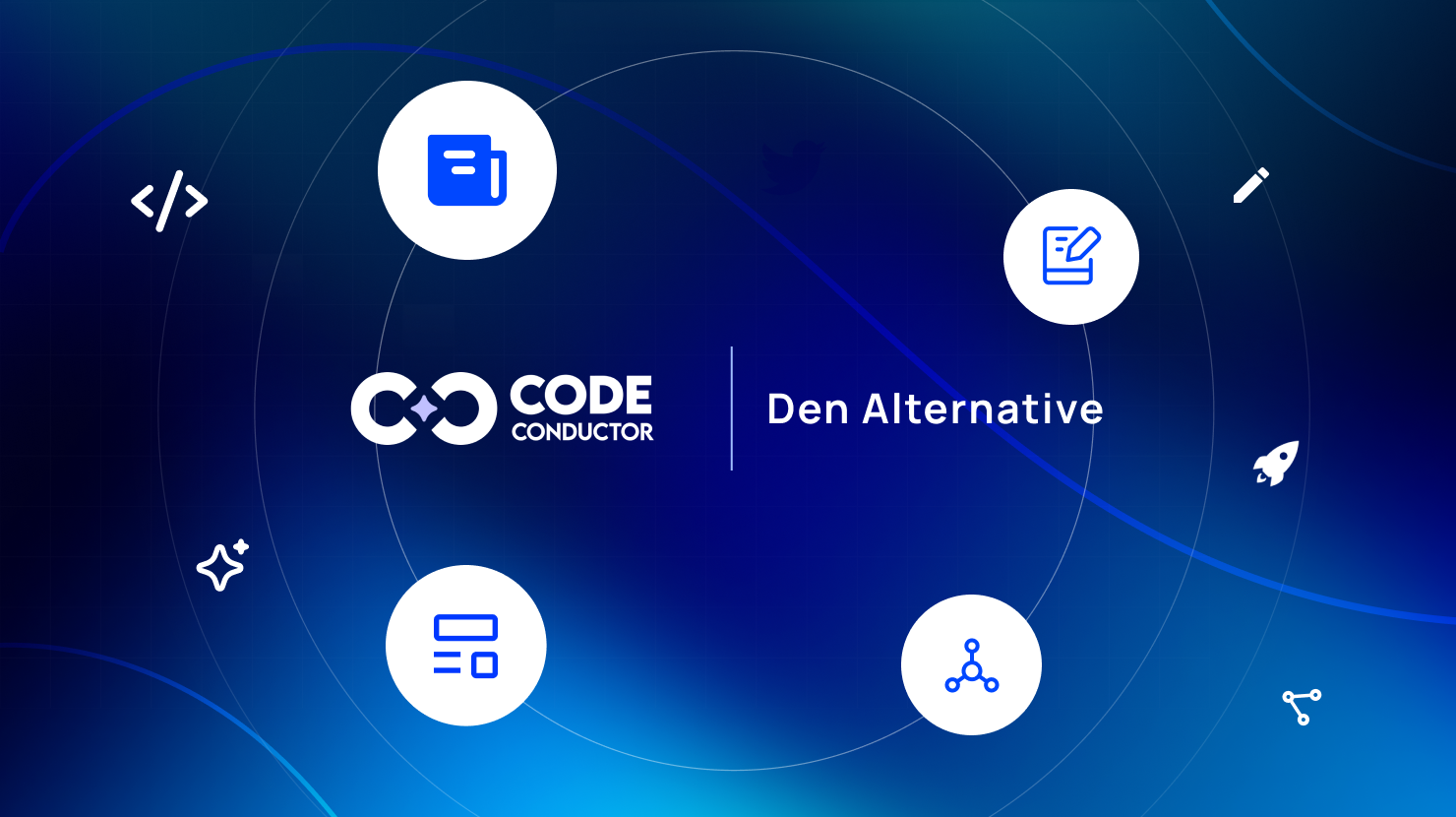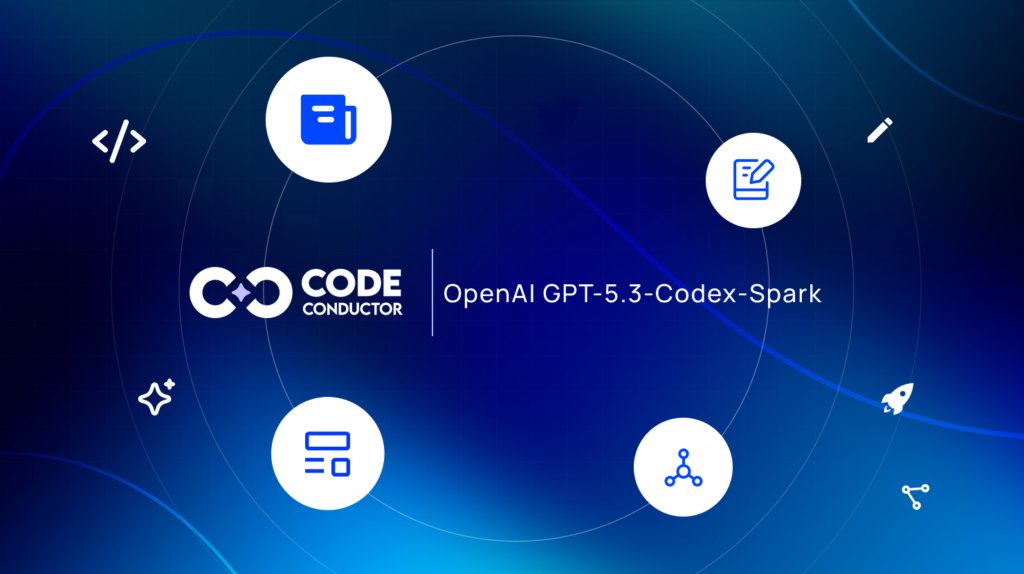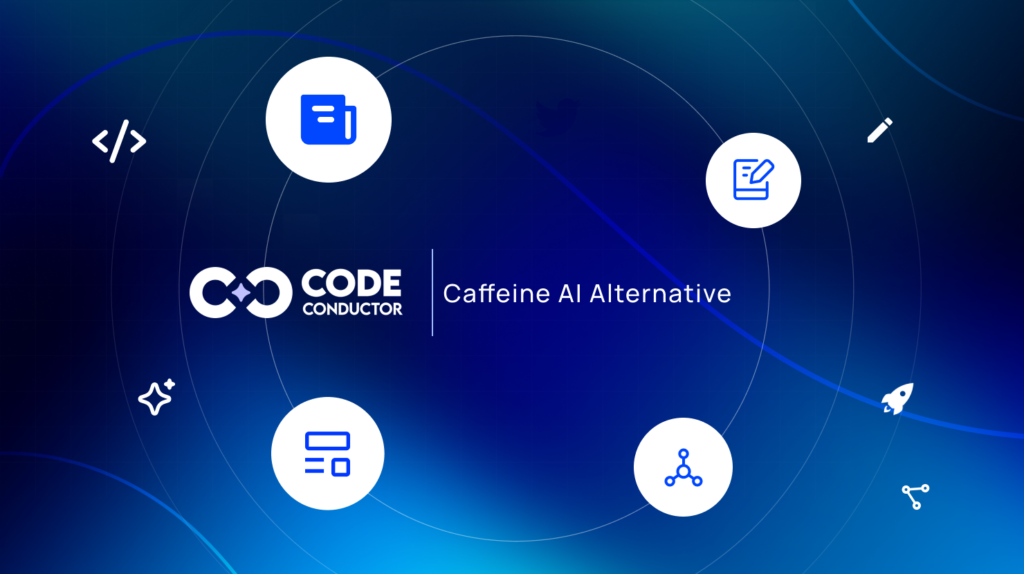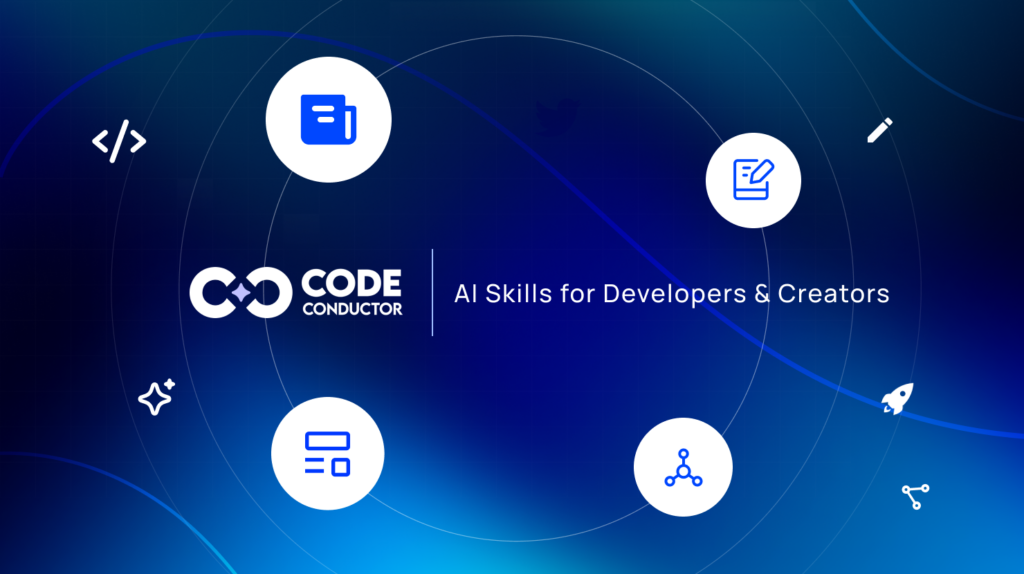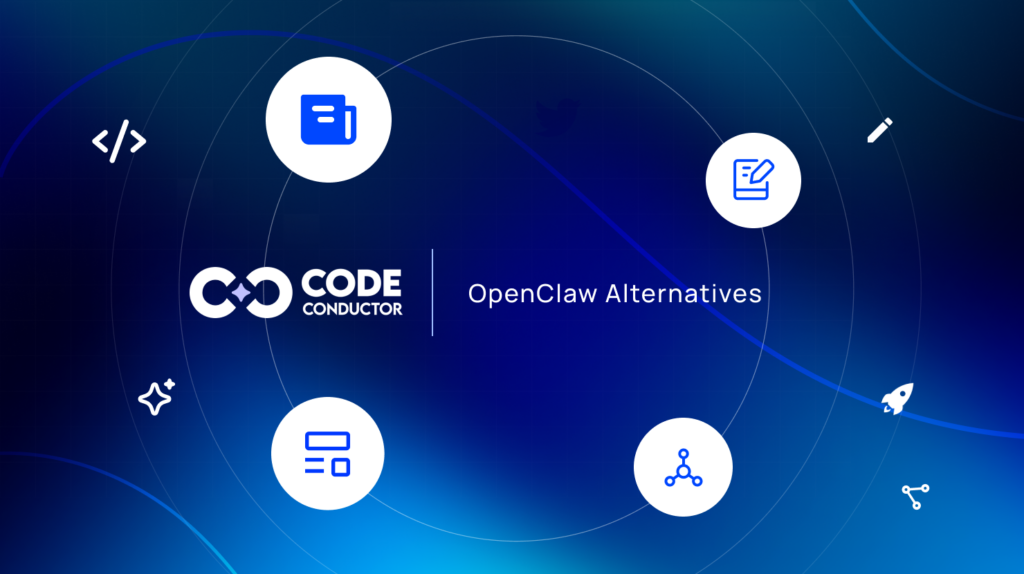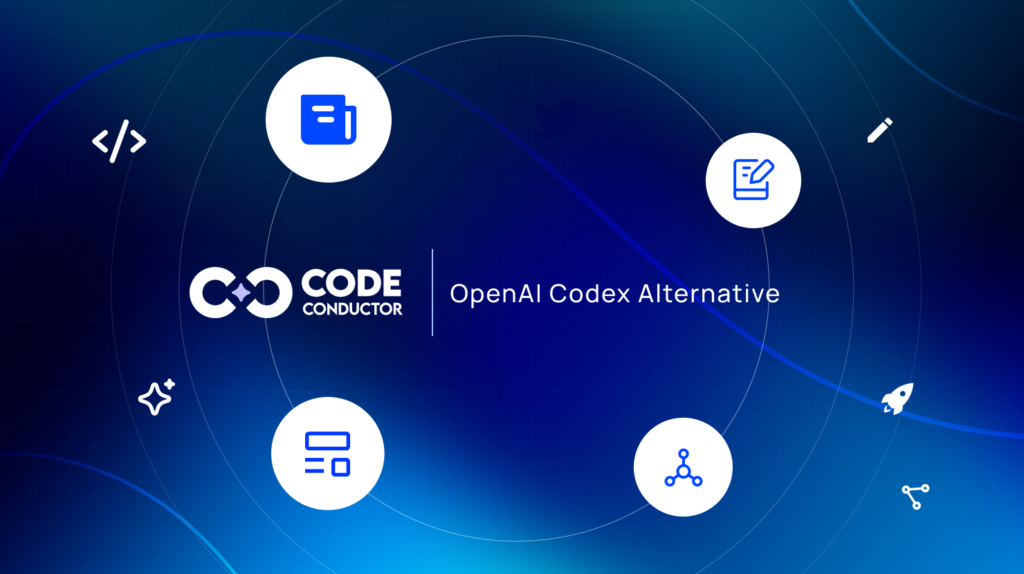Share at:
Is your team relying on Den for chat-based AI agents, only to discover that it limits what you can truly build, automate, or scale? As organizations push beyond simple AI experiments, they find that while conversational bots are a great start, they often hit a ceiling in complexity, memory, and deep system integration.
While Den excels at embedding AI in collaborative contexts, teams ready to design, coordinate, deploy, and manage truly intelligent workflows across their entire tech stack are turning to a more robust alternative: CodeConductor.
This article breaks down the strengths and limitations of Den and shows why a platform like CodeConductor is the true alternative and even the next logical step for building production-grade AI automation.
In This Post
- What is Den & Its Features?
- Looking for a Den Alternative? – Check CodeConductor
- CodeConductor vs Den: Feature-by-Feature Comparison
- Which One Should You Use: Den or CodeConductor?
- CodeConductor reviews
- Den Reviews
- What Marks the Shift from Conversational Automation to Workflow Intelligence?
- In a Nutshell: Which is the Best Alternative for Den in 2026
- FAQs
- What is a better alternative to Den?
- Can CodeConductor replace Den?
- Does Den support multi-agent systems or persistent logic?
- What makes CodeConductor better for product, automation, and IT teams?
- Can CodeConductor replace both Den and Zapier for enterprise automation?
- Does CodeConductor support multi-language agent development?
- Top AI Platform Alternatives You Shouldn’t Miss in 2026
What is Den & Its Features?
Den, a Y Combinator–backed startup, has gained popularity by making AI accessible within the spaces where teams already work. It embeds AI agents directly into chat and documentation interfaces like Slack and Notion, allowing teams to:
- Quickly launch AI agents using the natural-language triggers: A user can simply type a command in plain English to activate an agent, making it highly accessible for non-technical users.
- Integrate agents directly inside Slack threads and Notion docs: Den lives where your team collaborates, perfect for on-the-fly assistance like generating meeting notes or summarizing long documents without context switching.
- Connect agents to apps and data sources for lightweight automation: Den can link to common SaaS tools to perform basic actions, such as creating a Jira ticket or a Google Calendar event from a chat conversation.
Den’s core value is its frictionless entry into AI. However, this simplicity creates limitations. It struggles with complex workflows that require conditional logic, robust error handling, or parallel processing.
Its memory is typically confined to a single conversation, preventing it from building long-term context about users or processes, which is critical for sophisticated automation.
Looking for a Den Alternative? – Check CodeConductor
CodeConductor.ai is a no-code AI development platform engineered for teams building intelligent, production-grade systems. It’s not just another chatbot; it functions as the central nervous system for your company’s AI-driven processes, providing the robust backend infrastructure needed for scale and reliability.
Where Den offers a simple conversational front-end, CodeConductor provides the engine room. Here are its core differentiators.
From Prompt-to-Code Prototyping to Full Engineering Control
CodeConductor bridges the gap between idea and implementation. You can start by describing a workflow in plain English. The platform then generates a functional, code-based prototype—often a complete Python script or configuration file.
This allows for rapid validation without manual boilerplate coding. From there, developers have full control. Unlike restrictive low-code platforms, CodeConductor provides open access to the generated code. Engineers can immediately customize the logic, import any library, and integrate it into their existing toolchains.
True Multi-Agent Coordination with Persistent Memory
This is where CodeConductor fundamentally differs from chat-based tools. You can build multiple, specialized agents that collaborate to solve complex problems.
Example:
A TriageAgent receives a customer support email, extracts the key issue, and routes it to a TechnicalAgent.
The TechnicalAgent accesses a private knowledge base (enabled by persistent memory) to find a solution, then passes instructions to a NotificationAgent to communicate back to the customer.
This is all powered by a persistent, long-term memory layer, allowing agents to recall user history and share context across workflows, leading to truly intelligent and personalized interactions.
Unmatched Flexibility and Architectural Freedom
CodeConductor is built on a modular, vendor-agnostic architecture. This means you avoid lock-in and can build a future-proof AI stack.
- Swap Components: Easily switch out the LLM (e.g., GPT-4 to Claude 3), the vector database, or other components within your code without redeploying your entire application.
- Extend Natively: Integrate with any tool via REST APIs, webhooks, CLI, databases (SQL/NoSQL), and file systems. This open, code-first approach contrasts with the “walled garden” of simpler platforms.
Enterprise-Ready Deployment Without DevOps Overhead
Get the benefits of secure, scalable infrastructure without the complexity of managing it yourself. CodeConductor supports flexible deployment options—including cloud, on-premises, and hybrid environments—ensuring it fits into your unique IT strategy.
Key Deployment Highlights:
- Multi‑Cloud Flexibility: Deploy to CodeConductor’s managed cloud or your own AWS, Azure, or Google Cloud environments, retaining control while benefiting from scalability and performance.
- On‑Prem Deployment: For teams with strict data sovereignty or compliance needs, host deployments inside your private infrastructure or VPC.
- Hybrid Options: Combine on-prem processing with cloud scalability to optimize cost and control.
- CI/CD & GitOps Integration: Native support for Git-based workflows and CI/CD automation for error-resistant deployment.
- Smart Resource Allocation & Monitoring: Built-in performance metrics and system monitoring ensure reliable, efficient AI workflows.
CodeConductor vs Den: Feature-by-Feature Comparison
| Feature | Den | CodeConductor.ai |
|---|---|---|
| Workflow Builder | Natural language prompts in chat | Prompt-to-code & code-first (Python/YAML) |
| Multi-Agent Coordination | Basic chaining in a single chat | Full coordination with shared memory & state |
| Persistent Memory | Session-limited (forgets after chat) | Long-term memory across agents & sessions |
| Workflow Complexity | Simple, conversational triggers | Programmatic flows with branching & error handling |
| Deployment | SaaS-only | Cloud, on-prem, hybrid |
| Integration & Control | Basic SaaS apps, limited customization | Full code access, APIs, CLI, CI/CD, DBs, webhooks |
| Ideal Audiences | Ops, HR, Customer Success (non-technical) | Engineering, DevOps, IT, and internal automation teams |
Which One Should You Use: Den or CodeConductor?
The right tool depends on your team’s goals and the complexity of the problem.
Use Den if you’re part of a non-technical team that needs quick wins:
- Operations, HR, or Customer Support teams that want fast, helpful AI inside Slack or Notion
- You’re building simple helpers, like bots that summarize chats or schedule meetings
- You don’t want to write code or manage complex systems
- Goal: Speed and simplicity for everyday tasks inside the tools you already use
Use CodeConductor if you’re building serious, scalable AI systems:
- Engineering, IT, or Automation teams responsible for backend systems or internal tools
- You need custom workflows with steps, logic, memory, and deep app integrations
- Your project needs multiple AI agents that work together and remember past actions
- You care about control, flexibility, and secure deployment (cloud or on-prem)
- Goal: Build AI that doesn’t just assist, but runs full processes for your business
Start with Den if you want to test ideas quickly. Switch to CodeConductor when you’re ready to scale those ideas into powerful systems that can run on their own.
CodeConductor reviews
Francesca C. – Code Conductor Important tool
- What do you like best about CodeConductor?
The code of conduct is used by my company for a series of behaviors to be observed towards colleagues and customers, it is very useful to understand all the regulations in your country. - What do you dislike about CodeConductor?
It helped me on how to behave with a customer, what to say and not say to colleagues so as not to offend their sensitivity and avoid problems of incorrect conduct. - What problems is CodeConductor solving and how is that benefiting you?
Helps with how certain corporate affairs should be resolved, such as managing corporate agreements with very important clients, avoiding making legal mistakes and getting into disputes with the country they belong to.
Den Reviews
Den is great. I use it for personal note taking/knowledge management and it does that super well, on top of being a great place for team members to collaborate. Love the UI choices.
What Marks the Shift from Conversational Automation to Workflow Intelligence?
Den and similar tools have proven the value of conversational automation. But the industry is moving toward workflow intelligence by creating autonomous, stateful systems that can execute complex business processes effortlessly.
Scaling AI means managing agent behavior, memory, and state over time, often without human intervention.
CodeConductor represents this evolution: a no-code AI-backed platform that lets you define structure, memory, and logic in code, turning AI from an assistant into infrastructure.
In a Nutshell: Which is the Best Alternative for Den in 2026
The choice depends on your destination.
- Den is the speed lane—perfect for fast, simple, chat-based enhancements.
- CodeConductor is your AI engine—designed to scale, control, and build intelligent systems.
👉 Ready to go from AI in chat to AI that runs your business? Try CodeConductor free today!!!
FAQs
What is a better alternative to Den?
CodeConductor.ai is a stronger alternative to Den for building scalable, multi-agent AI systems with long-term memory, deep integration, and enterprise-grade deployment flexibility.
Can CodeConductor replace Den?
Yes. While Den is great for quick chat-based agents, CodeConductor fully replaces it with support for persistent memory, complex workflows, real coding control, and secure deployments.
Does Den support multi-agent systems or persistent logic?
No. Den supports lightweight automations inside chat tools, but lacks shared memory, true multi-agent logic, and long-term session persistence—all of which CodeConductor provides.
What makes CodeConductor better for product, automation, and IT teams?
CodeConductor supports real engineering needs: multi-agent AI, GitOps workflows, full code export, CI/CD, and on-prem/cloud deployment, making it ideal for serious internal tooling or automation.
Can CodeConductor replace both Den and Zapier for enterprise automation?
Yes, CodeConductor combines Den’s agent logic with Zapier’s automation flexibility, supporting code-first workflows, API calls, and multi-step triggers across tools and teams.
Does CodeConductor support multi-language agent development?
Yes, while most workflows begin in Python or YAML, developers can extend functionality using any language via CLI, REST endpoints, or microservice calls.
Best Den Alternative – Try it Free
Top AI Platform Alternatives You Shouldn’t Miss in 2026
Share at:

Founder CodeConductor

